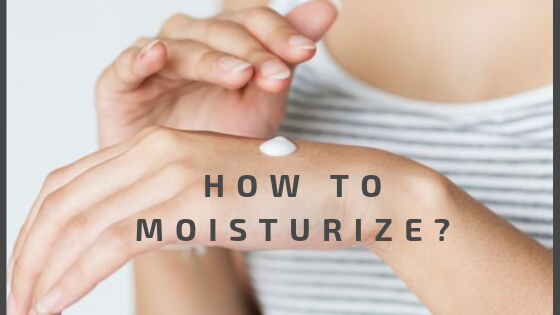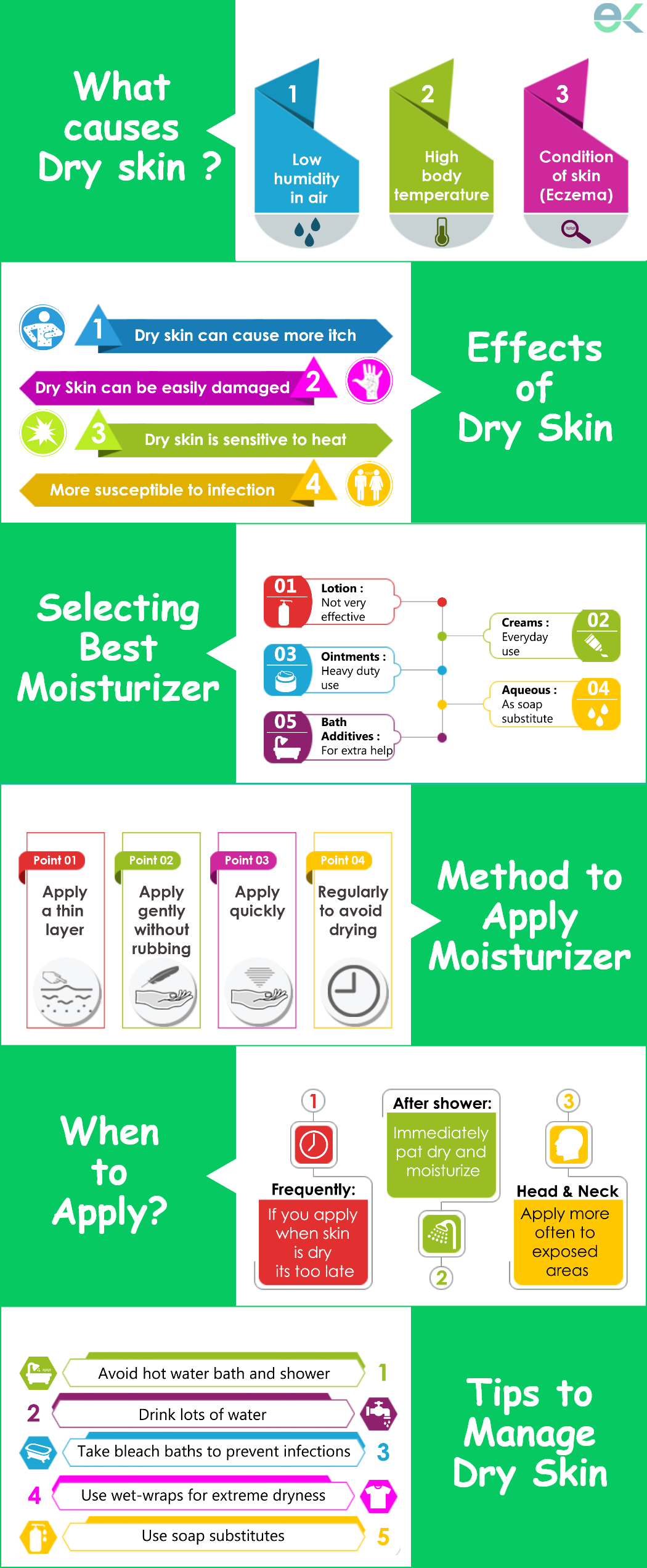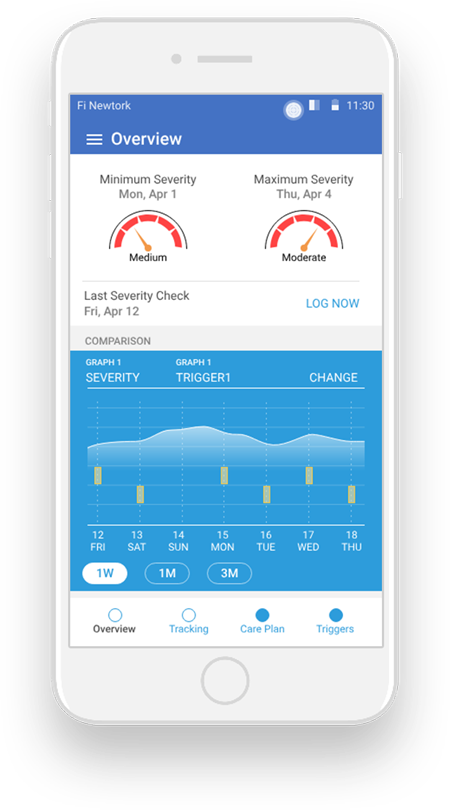How to Moisturize your Skin in Eczema?

Table of Content
Eczema and Dry Skin
Eczema also commonly known as Atopic Dermatitis is a chronic skin condition affecting all age groups, especially babies. Eczema is characterized by itchy, red and Inflamed skin which also makes the skin very dry. The skin usually becomes dry in winter and low humid condition or when the temperature is too high, In Eczema the skin becomes dry due to loss of Moisture. Generally, the skin tends to lose moisture, but in Eczema the skin loses the moisture more quickly,so it is important to moisturize your skin. In Eczema the uppermost layer of the skin loses its property of acting as a barrier which is called Skin Barrier dysfunction. The skin fails to retain moisture and water escapes more quickly and frequently making the skin dry. In such conditions it is important to know how to keep skin hydrated.
Severe dry skin further leads to crack and in extreme case may also bleed. Cracks open up allowing the entry to bacteria providing an avenue for infection
Dry skin also causes itch. Similarly, due to barrier dysfunction, the skin also fails to prevent the entry of foreign particles including microbes such as bacteria and virus increasing the chance of eczema infection. Additionally, very dry skin can trigger symptoms of eczema and cause the area to become itchy, known as pruritis, also increasing the likelihood of bleeding due to scratching. It further worsens the condition leading to the onset of “itch-scratch cycle” which occurs with rubbing or scratching the skin causing more irritation, and thus, additional itching. Excessive dryness of the skin can cause a flare-up of eczema worsening the condition. It is always good to know about the importance to moisturize your skin.


Importance of Moisturizing
It is very important to moisturize your skin in eczema. Effective moisturizing not only prevents it from drying but also helps in protecting the outermost layer of the skin known as stratum corneum or commonly known as a skin barrier.
Keeping your skin moisturized is one of the best solutions for eczema, but it should be done in a certain fashion, at proper intervals and by selecting appropriate moisturizers to make it more effective. You need to follow the tips below to effectively moisturize your skin if you have Eczema. Know the steps on how to keep skin hydrated.
Step 1 – Picking up the best moisturizer for eczema
For best result moisturize your skin effectively. Topical applications play a major role in controlling Eczema and come in different forms such as cream, lotion, and ointment. You must always go with the application that is best for Eczema.
Types of Topical Applications
Lotion
A lotion is a low viscosity topical preparation intended for application to the skin. Since it has higher water content than creams and ointments, it is more liquid and can be applied easily to external skin with a brush, cotton wool, clean cloth or with your bare hands.
Cream
A cream is a preparation used for application to the skin. Creams are semisolid emulsions (a mixture of more than one liquid that are normally immiscible) like water and oil. Roughly water and oil in a cream preparation is 50:50. One should always use the best eczema cream for better results. Creams are of two types “Oil in Water” and “Water in Oil”. The Water in Oil creams are more moisturizing because they provide an oily barrier which reduces the loss of water from the outermost layer of the skin
Ointment
An ointment is a semisolid preparation usually containing medicinal substances, which is intended for external application to the skin.
In Brief Lotions are thinner and more liquid than Creams. Creams are thinner than Ointments. Hence lotions are easy to apply than creams but are less effective when it comes to treating eczema. Creams are easy to apply than ointments because ointments have the least amount of water of the three.
Moreover, the physician prefers ointments over creams and lotions because of less content of additives than creams and lotions which may cause side effects, Ointment also lasts longer than the other two. If applying ointment becomes messy than creams are preferred. Finally, it’s up to the preference of the patient and which one suits him. The best moisturizer is one which is used appropriately, is effective in insulating against water loss and containing no additive causing side-effects.
Step 2 – When to apply?
After selecting the best moisturizer for eczema, one should also figure out the right time and frequency to get maximum benefit in the treatment. The best time to apply the moisturizer is immediately after your shower or as soon as you are out of a bathtub.
Take a bath in warm and Avoid Hot water as it may raise the body temperature resulting in water loss. Sitting in a Bathtub for 10 –15 mins shall help tour skin soak enough moisture.
After shower Pat dry your instead of rubbing with a towel which may damage your skin further and apply the moisturizer immediately when your skin is still wet.
Reapply the moisturizer frequently at a regular time interval or as soon as the previous application dries up to retain the skin moisture effectively. The frequency may be different for different parts of the body for e.g. body parts such as hands and face which are exposed may require more frequent application. Also, do not forget to reapply whenever you wash your hands as washing hands will also wash away the moisturizers applied.
Step 3 – How to Apply?
To get the best healing from the moisturiser it is important for us to know how the moisturizer acts when applied on the skin and how to keep skin hydrated. The main objective with which the moisturizer is applied to the skin is to retain the moisture of the skin which evaporates, rather than adding water to the skin from outside.
Hence, it should be applied in a thin layer to provide insulation for the water inside the skin and not very thick because thick layer will trap the heat inside which may worsen then condition.
Eczema is very sensitive to rough treatment, do not rub hard as it may further damage the skin, a gentle touch is always ideal even applying the moisturizers. Apply the moisturizer softly but effectively covering all the skin area, especially the effected and exposed ones. While applying, apply quickly without consuming much time before the wet skin gets dried up.
Moisturizing Tips
- Bathing or taking a shower is always a good way of moisturizing the skin in eczema, just avoid extended period and hot water, instead use luke-warm water.
- A bath with an appropriate amount of bleach added to the water may give relief from eczema symptoms. Moreover, a bleach bath can kill bacteria on the skin preventing infections, reducing itching, redness, and scaling. Consult your doctor before giving it a try.
- Use moisturizer prescribed by the physician instead of over the counter as medicated moisturizers have the added benefit of reducing side effects.
- Apply topical medication if you use one before applying moisturizer to enhance the healing.
- Be sufficiently hydrated by drinking enough quantity of water and juices to keep your skin moist.
- Try wrapping your skin with a therapeutic wet bandage or use paper towels, make them wet and place over the skin and top them up with dry dressing once the bottom layer dries you can remove and replace it another wet one.
- If the climate in your area is to dry and less humid use humidifiers in your rooms to make the air moist to comfort your skin.
- While using a moisturizer or liquid cleanser (soap) use pump dispenser instead of an open container in order to avoid the spreading of the infection.
- Avoid using soap as it increases the PH level of the skin and makes it dry, instead use a gentle cleanser to avoid scrubbing with a loofah.
GET IN CONTROL OF YOUR ECZEMA
Use our AI tool to check the severity of Eczema and keep track of your Eczema progress.



